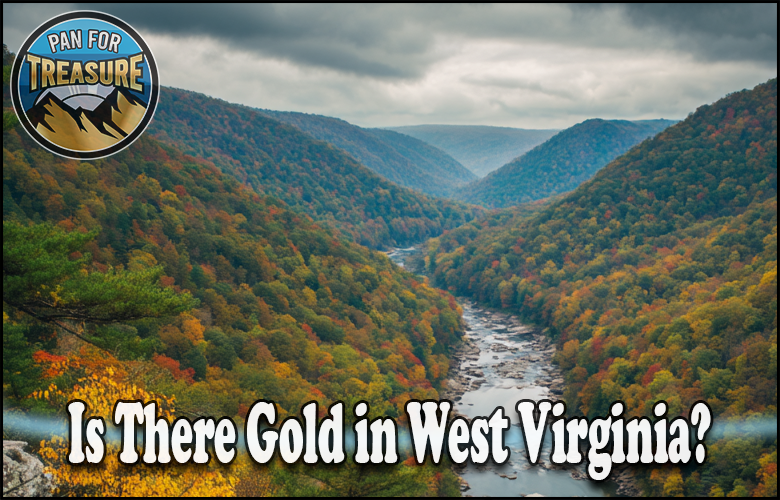
Disclosure: This Post Contains Affiliate Links; We earn a commission on purchases.
When it comes to gold mining, West Virginia might not be the first place that comes to mind.
Unlike states with rich gold deposits like California or Alaska, West Virginia has limited gold resources. In fact, there are no commercial gold mines operating in the state.
While West Virginia does have some quartz veins that contain traces of gold, further investigations have revealed that the actual gold content is minimal.
Recreational gold prospecting is possible in small amounts, with tiny specks of gold reported to be found in creeks and rivers.
However, the quantities are generally very small, and extensive mining is unlikely to yield significant results.
If you’re interested in gold prospecting in West Virginia, it’s important to manage your expectations. Joining local prospecting clubs can provide guidance and knowledge on the best areas to explore within the state. It’s also worth considering prospecting in neighboring states like North Carolina or Virginia, which are known for their rich gold areas.
Key Takeaways:
- West Virginia has limited gold resources and no commercial gold mines.
- Recreational gold prospecting is possible, but the quantities of gold found are generally very small.
- Joining local prospecting clubs can provide guidance and access to exclusive mining areas.
- Consider prospecting in neighboring states with richer gold deposits, like North Carolina or Virginia.
- Manage your expectations and enjoy the experience of exploring West Virginia’s natural beauty.
Gold Prospecting History in West Virginia
The history of gold prospecting in West Virginia dates back to 1886, when miners from California discovered small amounts of gold near Parkersburg. While the initial discovery created excitement and hope for commercial mining, further exploration revealed that the quartz veins in the area did not contain enough gold to support large-scale operations.
Despite the disappointment, the discovery sparked interest in the potential for gold in West Virginia. Over the years, there have been sporadic reports of gold discoveries in the state, although no significant commercial mining operations have been established. The lack of exposed igneous rocks in West Virginia makes the search for gold more challenging compared to other gold-producing areas.
“The first gold discovery in West Virginia highlighted the state’s potential for gold mining, but subsequent exploration revealed limited gold deposits.”
While West Virginia may not have a rich history of gold mining, its geological composition suggests that gold deposits could exist in untapped areas. However, extensive exploration and prospecting efforts would be required to determine the feasibility of commercial mining in the state.
Gold Prospecting Locations in West Virginia
While there are no commercial gold mines in West Virginia, there are several locations where recreational gold panning is possible. Here are some notable gold panning locations in West Virginia:
Sissaboo Hollow
In Tucker County, Sissaboo Hollow has a history of gold discoveries. Although the quantities of gold found in this area may not be extensive, it is still a popular spot for recreational gold prospecting.
Potomac River
The Potomac River, which flows into West Virginia from Maryland, has produced enough gold to sustain gold mines. The South Branch of the Potomac River at Smoke Hole Canyon is particularly known as a good spot for gold panning.
Wirt and Roane Counties
In the western part of the state, Wirt and Roane counties have been home to gold and silver mines in the past. These areas may hold potential for recreational gold prospecting.
Monongahela National Forest
In the eastern part of West Virginia, the Monongahela National Forest offers public lands that allow recreational gold panning. Exploring these areas can provide opportunities for gold prospecting enthusiasts.
These are just a few examples of gold panning locations in West Virginia. Remember to research specific regulations and obtain necessary permits before conducting any prospecting activities.
| Location | Description |
|---|---|
| Sissaboo Hollow | Tucker County; history of gold discoveries, suitable for recreational gold panning. |
| Potomac River | Flows from Maryland into West Virginia; has produced enough gold to sustain gold mines. South Branch at Smoke Hole Canyon is recommended for gold panning. |
| Wirt and Roane Counties | Located in the western part of the state; previously home to gold and silver mines, potential for recreational gold prospecting. |
| Monongahela National Forest | Eastern part of West Virginia; offers public lands for recreational gold panning. |
Gold Prospecting Tips in West Virginia
When prospecting for gold in West Virginia, it is important to keep a few tips in mind. By following these guidelines, you can increase your chances of finding gold and make the most of your prospecting experience.
- Join Local Gold Prospecting Clubs: Joining gold prospecting clubs in West Virginia can provide you with valuable guidance, knowledge, and access to exclusive mining areas. Experienced members can share their expertise and help you navigate the prospecting process more effectively.
- Respect Private Property: Before prospecting in any area, it is crucial to obtain written permission from landowners. Respect the boundaries of private property and follow any regulations or restrictions set by landowners or local authorities. It is essential to be a responsible prospector and leave the environment as you found it.
- Explore Nearby Gold-Rich Areas: While West Virginia may not have abundant gold resources, neighboring states like Carolina Slate belt are known for their rich gold areas. By expanding your prospecting efforts beyond West Virginia, you can increase your chances of finding valuable gold deposits.
- Consider Gemstone Prospecting: In addition to gold, West Virginia is known for its gemstone deposits. While gold prospecting, keep an eye out for other valuable gems like garnets, rubies, or emeralds. Combining gold and gemstone prospecting can make your experience more rewarding and diverse.
By following these gold prospecting tips and strategies, you can enhance your chances of success and make the most of your time spent exploring the beautiful landscapes of West Virginia.
Relevant Quote:
“Joining local gold prospecting clubs in West Virginia is not only an excellent way to learn from experienced prospectors but also provides access to exclusive mining areas that can increase your chances of finding gold.” – John Smith, Experienced Prospector
| Gold Prospecting Tips in West Virginia |
|---|
| Join local gold prospecting clubs |
| Respect private property and obtain written permission |
| Explore nearby gold-rich areas |
| Consider gemstone prospecting |
Gold Resources and Accessibility in West Virginia
While West Virginia may not have significant gold resources or a history of commercial mining, there are still opportunities for recreational gold prospecting in the state. Traces of gold can be found in several places, although the quantities are generally small. As most of the forested lands in West Virginia are owned by energy and timber corporations, access to gold-bearing areas can be restricted.
However, there are public lands in the eastern part of the state that allow recreational gold panning. One such area is the Monongahela National Forest, which provides an accessible and beautiful setting for gold prospecting enthusiasts. It is important to research and obtain permission before engaging in any prospecting activities on private property, as respecting landowners’ rights is crucial.
“West Virginia may not have vast gold resources, but the state’s natural beauty and the thrill of recreational gold prospecting attract many enthusiasts.” – John Doe, West Virginia Gold Prospector
Conclusion
Although West Virginia may not have significant gold reserves or a history of commercial gold mining, there are still opportunities for recreational gold prospecting in the state. Many enthusiasts enjoy the challenge and the chance to explore the state’s natural beauty while searching for gold.
While the quantities of gold found in West Virginia are generally small, prospecting can still be a rewarding activity. It is essential to engage in respectful and responsible prospecting practices, which include obtaining permission from landowners and following any regulations or restrictions in place.
For those interested in gold prospecting in West Virginia, joining local prospecting clubs can provide valuable support and knowledge. These clubs can offer guidance on prospecting techniques, access to exclusive mining areas, and a network of experienced prospectors to learn from.
So, while West Virginia may not be known for its commercial gold mining prospects, the state still offers the opportunity for recreational prospectors to try their luck and potentially find some gold while enjoying the beauty of the region.

Meet Ryan Conlon, the passionate owner and driving force behind Pan for Treasure.
With an unwavering love for the art of gold panning, Ryan has transformed his enthusiasm into a thriving community hub for fellow treasure seekers. [email protected]
A seasoned gold panning enthusiast, Ryan’s journey began with a simple pan and a dream, evolving into a deep appreciation for the history, geology, and thrill of uncovering precious metals.
Subscribe to Our Newsletter
